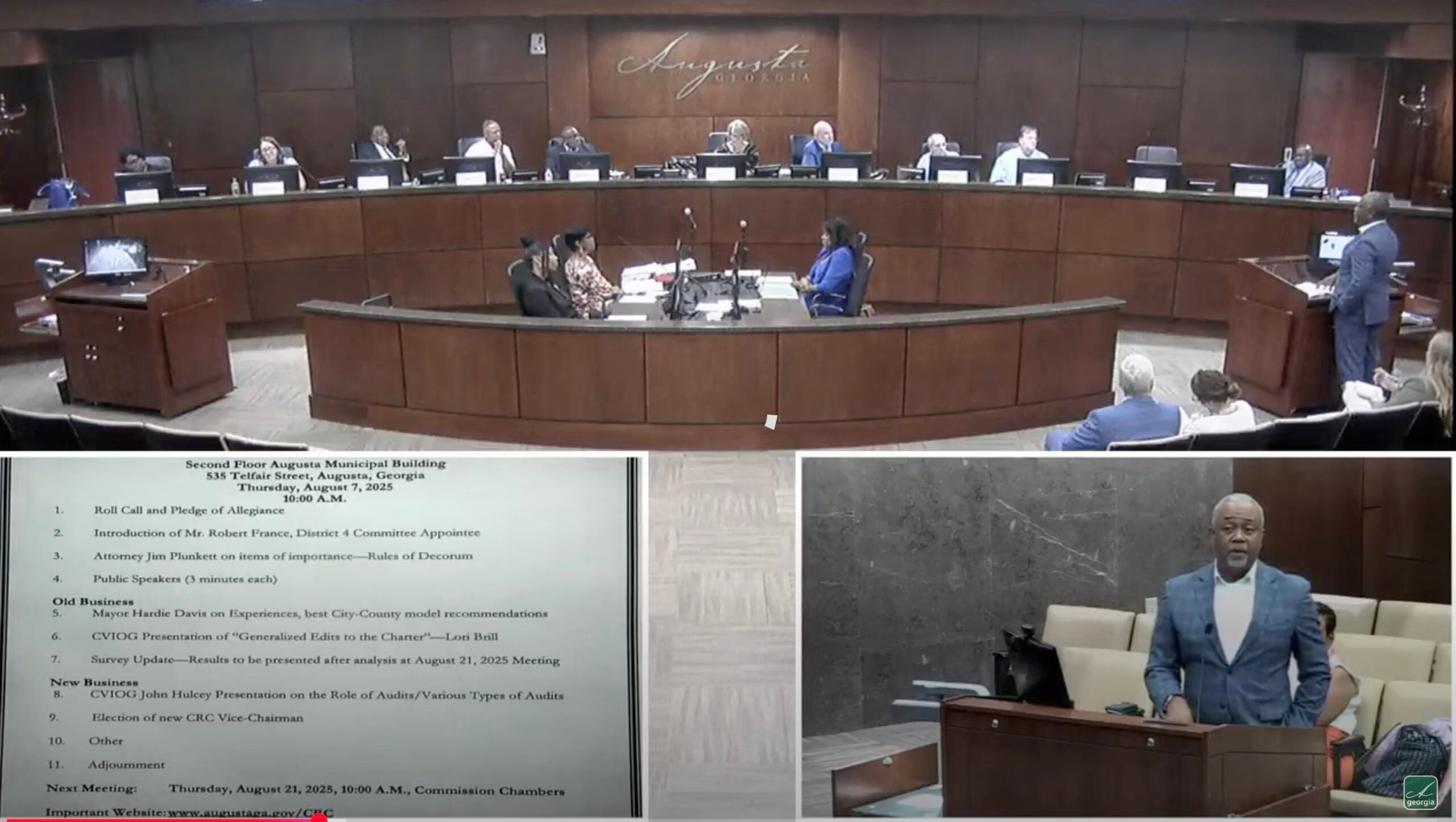Probably the most important question for Augusta’s Charter Review Committee, former Mayor Hardie Davis said Thursday, is whether the city wants a mayor.
“If the answer is yes, then that office must be empowered, not undermined,” Davis said. “The mayor must have the authority, accountability and responsibility to lead, not merely supervise.”
Davis is the third of Augusta’s five post-consolidation mayors to address the committee, which is charged with recommending changes for the 30-year-old charter.
The committee has considered creating a so-called “strong mayor” who effectively runs city government, or giving authority to a hired manager, or leaving it in the hands of the Augusta Commission. No decisions have been made.
Discussion planned Thursday of vesting power in a manager who reports to the mayor, subject to commission consent and removing the mayor’s vote was postponed until consultants with the Carl Vinson Institute of Government could prepare a presentation on the subject.
The committee is at the forefront of a “vital moment” for Augusta, to “reaffirm who we are, how we govern and where we are headed,” Davis said.
A second “absolute,” he said, is a government with “clear lines of governance. Blurred governance lines invite dysfunction, not unity, and oftentimes chaos.”
Davis said he experienced firsthand the confusion inherent in the consolidation charter as to “who decides, who answers and who acts.”
A third absolute is “it cannot be Black versus White,” he said. “I know what it is to be around people who couch the issue of Black versus White. The reality of it is it’s far too along in Augusta’s history to still be doing that.”
The fourth absolute is “somebody has to be in charge,” Davis said. “A city that cannot name its leader is a city that’s unsure of its direction.”
Augusta’s mayor, designated its chief executive in the current charter, has been “diminished significantly” over the years, he said, urging the committee “not to look for ways to further undermine the role.”
Committee member Sheffie Robinson asked Davis whether the mayor having a veto or a vote with the commission, as Mayor Garnett Johnson gained last year in a referendum, was more important. With a strong executive branch, Davis said a veto is probably more important than a vote.
Committee instructed on decorum
In other action, city Senior Staff Attorney Zena McClain Haymon gave committee members instruction on meeting decorum. The group has routinely argued, interrupted one another and treated members and speakers inconsistently.
Basic decorum includes not addressing each other by name, speaking only when acknowledged by the chair, not disturbing a meeting with whispering or other activities and not reflecting adversely on a prior committee action.
Committee learns about audits
John Hulsey with the Vinson Institute discussed local government audits, primarily the annual financial report required by state law, but also the value of having an audit committee and what audits can and cannot do.
Audits increase transparency and instill confidence but won’t eliminate fraud or substitute for good internal controls, he said.
Committee member Lee Powell has presented a plan for establishing a strict internal audit process. It’s “one of the ways we can reestablish trust between the voters and the local government,” Powell said.
During brief public comment, former Commissioner Moses Todd suggested the committee consider a whistleblower program with rewards for reporting government misconduct.
Bryant named new vice chair
The committee elected member Clint Bryant as its new vice chair, replacing Tanya Barnhill-Turnley who had to give up her committee seat when she was appointed interim commissioner.
Eliminating super districts
The committee’s subcommittee on forms of government discussed eliminating the two super commission districts and leaving only eight regular districts. Chair Steve Foushee said eight districts “are probably sufficient.”
Robinson and Bryant warned the change might sink the revised charter at the polls. “If it’s not a big time game changer, leave it alone,” said Bryant, offering a coaching analogy.
Preventing ‘quorum manipulation’
Sometimes called “walking out to avoid a vote,” quorum manipulation is addressed in some charters. Robinson brought discussion of including such language to the subcommittee Thursday.
The governing body may call for censure, an ethics review or even removal for officials who intentionally depart to disrupt a quorum, vote or other official action, Robinson said.
Robinson also suggested including language to keep commissioners from skipping meetings. In cities such as Columbus, pay is deducted for each absence. Attendance may be required unless an absence is formally approved.
Do commissioners need offices?
Robinson called for ensuring “constituent access” by creating meeting space in public buildings for commissioners to meet with constituents.
Committee member Charlie Coleman said offering the space might encourage commissioners who already frequent city hall “pushing their agenda,”











